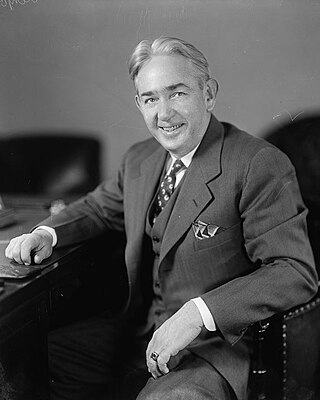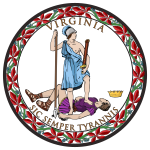
James Lindsay Almond Jr. was an American lawyer, state and federal judge and Democratic party politician. His political offices included as a member of the U.S. House of Representatives from Virginia's 6th congressional district (1946-1948), 26th Attorney General of Virginia (1948-1957) and the 58th Governor of Virginia (1958-1962). As a member of the Byrd Organization, Almond initially supported massive resistance to the integration of public schools following the United States Supreme Court decisions in Brown v. Board of Education, but when Virginia and federal courts ruled segregation unconstitutional, Almond worked with the legislature to end massive resistance.

The Readjuster Party was a bi-racial state-level political party formed in Virginia across party lines in the late 1870s during the turbulent period following the Reconstruction era that sought to reduce outstanding debt owed by the state. Readjusters aspired "to break the power of wealth and established privilege" among the planter elite of whites in the state and to promote public education. The party's program attracted support among both white people and African-Americans.

The Byrd machine, or Byrd organization, was a political machine of the Democratic Party led by former Governor and U.S. Senator Harry F. Byrd (1887–1966) that dominated Virginia politics for much of the 20th century. From the 1890s until the late 1960s, the Byrd organization effectively controlled the politics of the state through a network of courthouse cliques of local constitutional officers in most of the state's counties.

Albertis Sydney Harrison Jr. was an American politician and jurist. A member of the Democratic Party associated with Virginia's Byrd Organization, he was the 59th Governor of Virginia in 1962–66, and the first governor of Virginia to have been born in the 20th century.

Harrison Holt Riddleberger was a Virginia lawyer, newspaper editor and politician from Shenandoah County. A Confederate States Army officer who at various times aligned with the Conservative Party of Virginia, the Readjuster Party and the Democratic Party, Riddleberger served in both houses of the Virginia General Assembly, which elected him for one term as U.S. Senator.

The 1989 Virginia gubernatorial election was held on November 7, 1989. Incumbent Democratic Governor Jerry Baliles was unable to seek a second term due to term limits. Democratic nominee and Lieutenant Governor L. Douglas Wilder went against former Attorney General of Virginia J. Marshall Coleman in one of the closest elections in Virginia history. Upon taking the oath of office in January 1990, Governor Wilder became the first African-American governor of Virginia, and the first African-American governor of any state since Reconstruction more than one hundred years earlier.

The following offices were up for election in the United States Commonwealth of Virginia in the November 2009 general election:
Allie Edward Stakes Stephens, usually known as "A. E. S." or "Gi" Stephens, was a Virginia lawyer and Democratic Party politician who served in both houses of the Virginia General Assembly and as the 27th lieutenant governor of Virginia from 1952 to 1962. His state political career ended with a loss in the Democratic primary for Governor in 1961, after he and Governor J. Lindsay Almond broke with the Byrd Organization, which wanted to continue its policy of massive resistance to desegregation of Virginia's schools after both the Virginia Supreme Court and a 3-judge federal panel ruled most elements unconstitutional in 1959.

In the 1965 Virginia gubernatorial election, incumbent Governor Albertis Harrison, a Democrat, was unable to seek re-election due to term limits. Linwood Holton, an attorney from Roanoke, was nominated by the Republican Party to run against Democratic Lieutenant Governor of Virginia Mills Godwin.
The Commission on Public Education, known as the VPEC or Gray Commission, was a 32-member commission established by Governor of Virginia Thomas B. Stanley on August 23, 1954 to study the effects of the U.S. Supreme Court decisions in Brown v. Board of Education issued on May 17, 1954 and May 31, 1955, and to make recommendations. Its counsel were David J. Mays and his associate Henry T. Wickham.

The 2017 Virginia Attorney General election was held on November 7, 2017. The incumbent attorney general, Democrat Mark Herring, was expected to run for governor, but announced he would run for re-election instead. As only Herring and Republican John Adams qualified for their respective party primaries, the two automatically became their parties' nominees. In the general election, Herring defeated Adams to win a second term as Attorney General of Virginia. This is the last time that a Democrat was elected Attorney General of Virginia.

Frederick Thomas Gray was a Virginia attorney and Democratic Party politician. Governor J. Lindsay Almond appointed Gray to serve as Attorney General of Virginia after the resignation of Attorney General Albertis Harrison to run for Governor of Virginia during the Massive Resistance crisis in Virginia. Gray returned to private practice at Williams Mullen after Robert Young Button took office. Gray later served in the Virginia House of Delegates and the Virginia Senate as he continued his law practice.
Robert Young Button served two terms as Attorney General of Virginia, as well as a fifteen years as Virginia State Senator. Button rose through the ranks of the Byrd Organization and became one of its leading members as it ultimately crumbled as a result of the Massive Resistance crisis.

Dorothy Shoemaker McDiarmid was a teacher, real estate broker, Quaker activist, and Virginia legislator for nearly 26 years.

The 1968 Arkansas gubernatorial election was held on November 5, when incumbent Republican Winthrop Rockefeller defeated former Speaker of the Arkansas House of Representatives Marion Crank by a small margin. Rockefeller was first elected in 1966, and was the first Republican to hold the office since Reconstruction. This was the first time a Republican was re-elected as Governor of Arkansas.
The 1950 Massachusetts general election was held on November 7, 1950, throughout Massachusetts. Primary elections took place on September 19.

Henry Clyde Pearson was an American lawyer and politician from Virginia. He served in both the House of Delegates and the Senate. In 1961, he was the Republican nominee for Governor of Virginia.

The 1932 Washington gubernatorial election was held on November 8, 1932. Democratic nominee Clarence D. Martin defeated Republican nominee John Arthur Gellatly with 57.29% of the vote.
The 1944 Massachusetts general election was held on November 7, 1944, throughout Massachusetts. Primary elections took place on July 11.
















